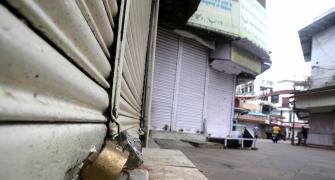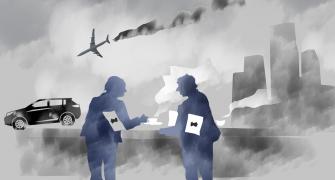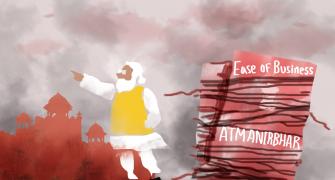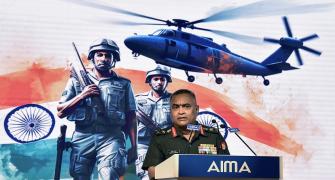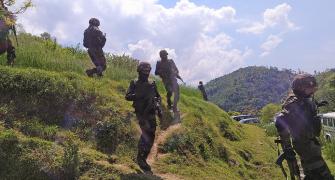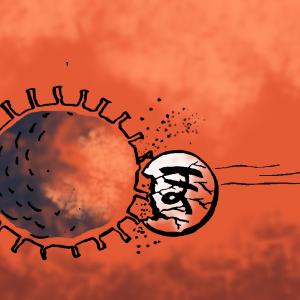'Without reviving employment, consumer confidence will not go up.'
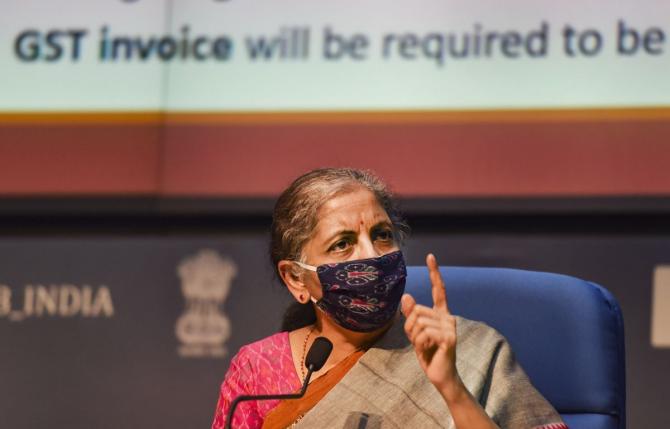
"Unless the government boosts demand by giving to the unemployed, demand will not go up," Professor Arun Kumar, the Malcolm Adiseshiah Chair Professor at the Institute of Social Sciences, tells Shobha Warrier/Rediff.com in the concluding segment of a two-part interview.
- Part 1: 'GDP declined by 50%, not 23.9%'
Is that why you say that the GDP contracted by 50% and not 23.9%?
Yes. The NSO (National Statistical Office) document which gave the figure of 23.9%, mentioned that because data was not available, they depended on company reports. But company reports were all from the organised sector and not from the unorganised sector.
Another point to note is, companies were given time till September to file the quarterly reports. Mostly those companies reported their results in June had done well. This gave an upward bias to the growth figures.
It was also assumed by the NSO that agriculture grew by 3%, but there was contraction in the agriculture sector also.
The poultry industry, dairy industry, flowers, vegetables and fruits suffered badly. A majority of the vegetables and fruits produced did not reach the market. They were rotting in the fields. So also for flowers.
As mid-day meals scheme in the schools was not working, milk and poultry industries suffered.
The NSO simply assumed that the production targets were fulfilled whereas that was not the case.
These industries contribute to 50% of agriculture and they contracted sharply rather than growing at 3%. Only food grains and pulses grew at this rate.
Finally, the NSO document did not take into account the unorganised sector, and even the decline in the organised sector. That's why my estimate was a contraction of 50% and not 23.9%.
The RBI survey shows that in July, consumer confidence was at record low. The investment sentiment was also at record low.
When investment is down, consumption is down and employment is down. So, growth will be slow.
Without reviving employment, consumer confidence will not go up.
When people are worried about losing their jobs, they are not going to buy cars or two-wheelers.
When consumer demand is low, there will not be much investment either.
Do you think investors will come from America to invest here when the demand is low?
Unless demand rises, investment from abroad will also remain low. There are special factors why Reliance Jio got so much investment.
The point is, how quickly can the economy recover from its low? I have argued that it is going to be a slow recovery, and also a painful one
Painful recovery?
Yes. It is not going to be a quick recovery.
The government needs to create demand, but the problem is, budget deficit is very high.
Why is the deficit high? Because the government had planned the 2020-2021 Budget for a 10% nominal growth. Instead, you have a -24% growth for the year.
At the optimistic level, it is going to be -24% and at the pessimistic level, -30%.
 Even if you take the RBI figure of -10%, instead of +10%, you have -10%. So, there is a 20% change in the Budget figure.
Even if you take the RBI figure of -10%, instead of +10%, you have -10%. So, there is a 20% change in the Budget figure.
It means your revenue collection is way down. But the government expenditure is up because of the pandemic.
If you take the Centre, state and public sector, the fiscal deficit was already about 10% of the GDP which was assumed to be Rs 224 lakh crore. Growth of -10% of the GDP makes it Rs 180 lakh crore.
So, 10% of Rs 224 lakh crore will become 14% of Rs 180 lakh crore. That means the fiscal deficit was going to be 14% of the GDP.
Along with this, there is the additional expenditure due to the pandemic. Then, of course, tax collection is down to half of last year. It will take the fiscal deficit to 25% of GDP.
This is unprecedented and the government will have to cut back on inessential expenditure and also raise resources from other sources.
Unless the government boosts demand by giving to the unemployed, demand will not go up. In fact, the situation will deteriorate further.
The economic packages did not yield the desired effect.
The answer is simple. They only catered to the supply side packages. They were not demand-creating packages.
For example, the agricultural reforms package, the loan promised to the MSME sector, offering partnership to private players, all these will have any effect only after 4-5 years. It will not have any immediate effect.
Why would a business that is not working, take a loan?
What you need today is means to create demand.
You mean, they should create employment?
Yes, create employment so that people will get money to spend. A MGNREGA or an Urban Employment Guarantee Scheme is needed as they can create employment today.
You need to take some immediate step, not something that will work after five years.
What the government should do is, come out with a survival package.
When do you see an economic revival?
There will be a revival, but it will take at least two years. To reach the 2019 size of the GDP (around Rs 200 lakh crore economy), it will take 2-3 years.
The economy is not like a rubber ball that you throw it to the ground, and it will bounce back immediately.
The economy has people, the economy has employment, the economy has manufacturing, tjhe economy has services. They are having difficulties and will not recover immediately.
We are going to have a very difficult time because we are not doing what we should be doing.
It is going to be chaotic as inequality will rise dramatically.
In the new normal, some sectors and sections will do well, and some will do very badly.
Your new book is titled Indian Economy's Greatest Crisis -- Impact of Coronavirus and the Road Ahead. What is India's greatest crisis now? The economic crisis or the humanitarian crisis that happened due to the lockdown?
Obviously, the humanitarian crisis, since that also includes the economic aspects.
The crisis is continuing and impacting most people, but importantly those that are the most vulnerable.

